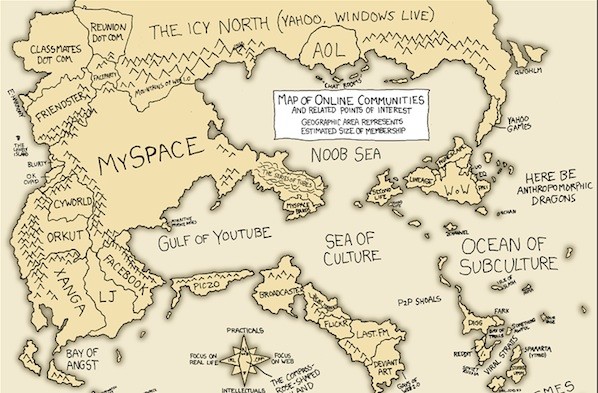Community and Writing in an Age of New Collectives

In Larry Sanger's history of the development of Wikipedia in Open Sources 2.0, the Wikipedia co-founder writes: For months I denied that Wikipedia was a community, claiming that it was, instead, only an encyclopedia project, and that there should not be any serious governance problems if people would simply stick to the task of making an encyclopedia. This was wishful thinking. In fact, Wikipedia was from the beginning both a community and an encyclopedia project. (p. 329; my emphasis). In other words, Sanger argues that the problems he associated with Wikipedia when he was head of the project -- the bias against experts, for example -- were a direct result of his acting as if Wikipedia were merely an unique, communal encyclopedia rather than a community that was producing an unique, communal encyclopedia.
What if we took Sanger's claim further? What if Wikipedia wasn't "both a community and an encyclopedia project," but rather a community which, as a byproduct of its interactions, produced an encyclopedia? In other words, what if the emergence of Wikipedia as an encyclopedia from what Sanger calls "an anarchy governed by some vague consensus" (Open Sources 2.0, p. 323) was primarily the result of community rules that governed how Wikipedians interacted with each other, and it was these interactions that led to the production of an encyclopedia?
There are at least two issues at stake in accepting this formulation: the first is whether we are to privilege authorial determinism in the creation of a text, in which those authors become responsible for all its features and stamping that text with their personal voice or authority, versus locating texts and their authors as parts of complex systems in which authorial determinism is only one factor in the text's creation. The former view is the perspective of many attempts to critique Wikipedia as being poorly written and untrustworthy because it cannot be connected to any such controlling voice. However, if we were to adopt the latter view, that texts emerge from complex systems, these critiques become far less important.
Wikipedia Community Took On Life of its Own
Of course, one can argue that the Wikipedia community developed from the specific desire on the part of Sanger and Jimmy Wales to create an online encyclopedia. However, it is clear -- particularly in Sanger's telling -- how this project got away from them, becoming something quite unlike what they had intended. The Wikipedia we have today is not the product of Sanger's vision, but rather an emergent text that was crucially dependent on the properties of the Wikipedia community, properties that he makes a compelling argument for having derived from the characteristics of wiki culture and the initial openness of Wikipedia. These two factors led to the particular features of the community, and they were what influenced the way the encyclopedia developed, particularly its explosive growth.
The second issue follows from the first: if we adopt the systems view of writing, a significant part of writing instruction would become instruction in the analysis of existing communities that an author wished to participate in and/or the creation of new communities.
Community Encourages Stronger Writing
Writing researchers have known for a long time that writing is a community practice. Cohen & Riel (1989, cited by Charney & Miller in Bazerman, 2008) have shown how middle-school students wrote better when their audience was a community, rather than just their teacher. This process of engaging with an audience is crucial, both to writing and community formation. As Nystrand writes in an essay in this collection, "speakers address their audiences…through particular texts but become members of their speech communities by learning the ways-of-speaking of these groups, and especially the potential for making many texts" (p. 15; cited in Charney & Miller). In other words, audiences are communities, and the best way to engage with an audience is to enter the community and absorb its "ways-of-speaking." As Viegas et al have shown, Wikipedia's development is highly dependent on these community behaviors, specifically, conversations between community members. Just as Wikipedia depends on this type of interaction, so does other online writing, and it is up to teachers to prepare them to manage these communities.
Writing Alone in the 21st Century
In short, if we want to prepare students for twenty-first century writing, on the Web and elsewhere, we need to prepare them to be part of communities.
When they conceive of writing projects, as Sanger and Wales did, they must consider the communities of writing that they will be engaging, or even creating, by virtue of their having initiated the writing project.
One way to do this is by leveraging the communities that students are already participating in, from those in their local neighborhoods, to online communities such as those around fanfics or social networks. The ability of computer networks to connect students with others in different physical locations provides a fertile ground for teaching students how to interact with new communities of writers.
Image credit: XKCD http://xkcd.com/256/
Comments